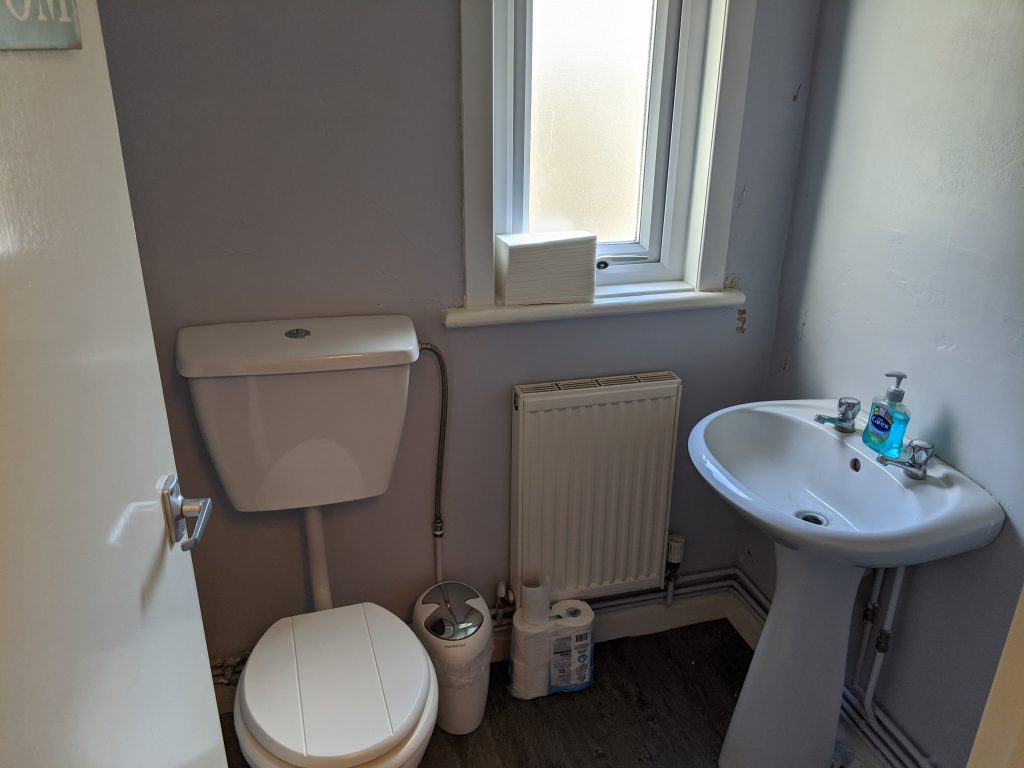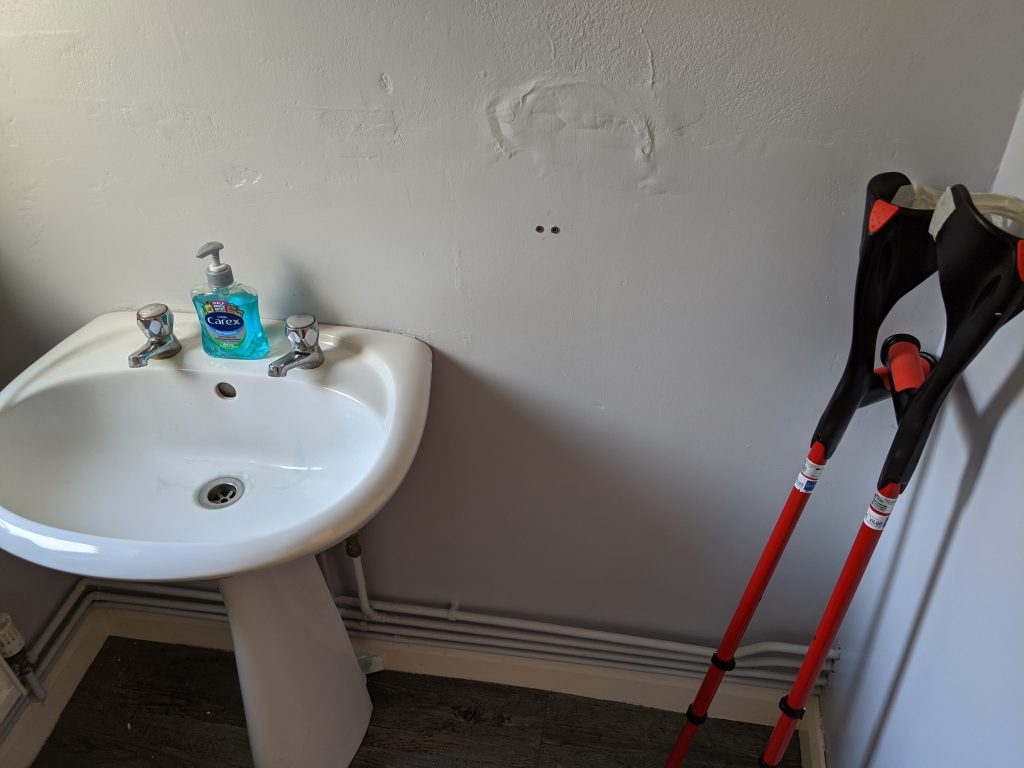Am I Revising Too Much?
With exam season about to get into full swing after several years of teacher assessment, it seems a strange question to ask, but stop and ask yourself “Am I revising too much?” Just how much is too much? And how much should you study during the holidays leading up to exams?
Even teachers and tutors are out of practice and are finding this year a shock to the system with revision. Over the past few years, our skills in striking a delicate balance between head in the books and head space need sharpening. In particular, those of you sitting A Levels in 2022 are the first in generations to be sitting exams for the first time at age 18.
Exams are not just about the ability to simply recall key words, but being able to apply then in context; and this is where long term memory techniques are needed! Comitting information to your long term memory requires a combination of repetation of similar topics in small chunks, and a low stress environment.
According to Barnaby Lennon, ICS (Independent School Council) Chairman and former Headmaster of Harrow, students should be revising for 7 hours each day for most of the Easter Holidays. This applies to both gcse and a level students. Whilst I don’t entirely disagree with him (and certainly don’t disagree with his methods), my own approach uses the 10-minute approach that can be applied to any year group.
The 10 minute method is usually applied to the amount of time for homework during a usual term time. But can be easily adapted to plan revision during the holidays full stop new line the system suggests 10 minutes of study for each year of education per day. For example, in year 11 in the UK, you’ve been in formal education for 12 years:
12 x 10 minutes = 120 minutes or 2 hours per night
This means that over 5 days you’ll be studying 2 hours per night or 10 hours per week when also attending school with usual lessons.

Using Barnaby Lennon’s theory, if you continue your 2 hours of homework time throughout the holidays and add the time you would usually be in class (5 hours) then 7 hours makes perfect sense. However, class time also includes group discussion, admin (register, answering questions, other disruptions) so working individually may not actually require quite so long.
Instead, try this equation for working out your revision schedule (even if your exams are looming large, it’s not too late to set a schedule!):
10 Minute Rule (TMR) = (Year Group + 1) x 10 minutes
TMR x 5
Add (2 x Number of Subjects)
Using this, the average Year 11 with eight GCSE subjects could calculate their time in the following way:
TMR = (11 + 1) x 10 = 120 minutes per day (2 hours)
(TMR x 5) + (Subjects x 2)
(2 x 5) + (8 x 2)
10 + 16
= 26 Hours per week during the holidays
OR
5.2 hours each day
But how do I spend that much time studying?!
Breaking down your revision into manageable chunks will help. using the calculation above, you could cover all 8 subjects each day with 40 minutes per subject.
Study for 80 minutes, then build in a 20-minute break. The example below shows how you could divide your eight subjects into smaller, more manageable daily chunks. This is a technique called “time chunking’ that many bloggers and vloggers use to maximise their time:
| 9.00 | English |
| 9.40 | Maths |
| 10.20 | BREAK |
| 10.40 | History |
| 11.20 | German |
| 11.40 | LUNCH |
| 12.40 | Computer Science |
| 1.20 | Science 1 |
| 1.40 | BREAK |
| 2.20 | Music |
| 2.40 | Science 2 |
| 3.20 | FREEDOM! |
For the days you want to go out with friends, or just have a little downtime, split the study in two or get started little earlier. Don’t be tempted to remove the breaks though! It’s important to give your brain some time to digest the information – just like you wouldn’t go for a run straight after a meal.
If you’re struggling to set out your study plan, you can always use a timetable templates like my Painlessly Planned Revision planner to help get organised. Just remember to spend more time revising then planning!
Congratulations To Our Students of 2021
The class of 2021 has had it tough and results week for us was unusual in a number of respects. Overall, our students who attended tuition with us achieved some incredible results, with not just a 100% pass rate, but a 100% B-A* at A Level and 55% grade 6+ at GCSE (with 100% grade 4 or above).
Celebrating results is such a small part of our journey, but it’s the ultimate end to a journey that we’re incredibly proud to be part of.
got an A!!!! So pleased and thank you for all your help. Parent – AS International Computer Science
We were also able to offer assessment help to a number of private candidates through linked private exam centres such as Tutors and Exams. Pulling together invigilated assessments and tutor assessed grades for both GCSE & A Level was not easy and a huge thank you from me goes to all of our tutors who helped get these students over the line at a difficult time for everyone.
I’m over the moon with my A*A*B. Thank you very much for all your help, you’ve been amazing!
Student – A Level Maths & Further Maths Assessment
This year we had an inkling of some of the results as we had been involved in assessment which meant that we’d been keeping some pretty massive secrets for a few months. As with all assessments, these had been through vigorous moderation and we were delighted that all grades went through this year without changes and some positive feedback from moderation panels.
We were absolutely over the moon for our students, some of which had worked through the most upsetting circumstances to come out the other end with the option to start the new academic year in a far better place than ever predicted. We are incredibly proud of how each and every one of our students worked.
Hello, I am really happy with my results. I got into my firm choice! Thanks for being part of my journey as my tutor.
Stelli – A Level Computer Science Assessment
This year, we’ve taken some time to enjoy the relative peace of the last few weeks of the summer and appreciate the hard work that goes in from students, tutors, and parents to get such well deserved grades. All of this has been added into our annual reflection which will help us to improve what we do and carry on supporting our students no matter what turns up to challenge us!
I managed to achieve an A in computer science, an A* in maths and an A* in Economics (+ a B in further maths AS from the year before).
But all in all I can truly say I’m the most proud of my grade in CS as we put the most effort possible into achieving that grade. It’s funny to remember the first time we spoke and I said I would like, maybe a B, probably a C and wow how that changed!
Thank you so much for your kind wishes and I too am wishing the best for the future students you may have, and the furthered development of TeachAllAboutIT. Im sure your students this year did amazing too 😀
Take care Holly and the team!
Josh – A Level Computer Science Home Ed
Reflecting on Tuition During 2021
We’re now in our third year of gathering data from both students and staff as part of our ongoing reflections. This is to ensure that TeachAllAboutIt stays focused on our primary goal of making education accesible & enjoyable to everyone. Writing a public post on how we’re doing never gets any easier, but I maintain that being transparent about our feedback is a positive thing – even when we get things wrong.
Key Performance Indicators
This year, I’ve added in KPIs as we have grown as a company and these help us to focus on what our ethos is and how our work helps everyone to acheive this throughout the year. Feedback has still been evaluated using the formal teaching standards as I believe that these help us to remain focused on tuition as a profession.
Student Outcomes
Maintain our 100% pass rate for all students
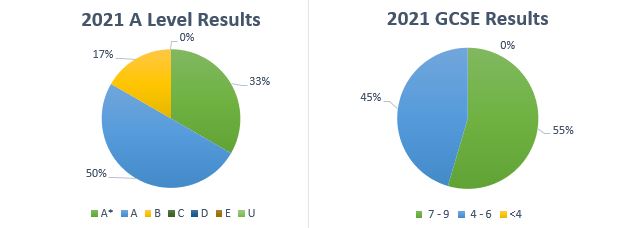
Student Attendance
Increase student attendance rate from 92% (2020) to 95% each term
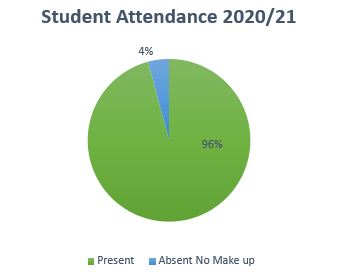
Enrolment Numbers
Increase number of lessons taught to 700 by 01/07/2021
Actual: 1051
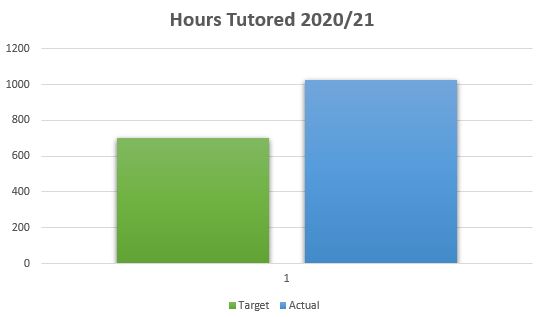
Turnover
Increase turnover in excess of current year planned budget to fund development of a further GCSE course and additional Home Education session in 2022
Courses Developed Summer 2021
September 2021: iGCSE ICT Course & KS3 Computing Course
Reflections on Feedback
Back in our first blog at the end of the 2018/19 year, I talked about the vulnerability that publicly posting our feedback online created, but since then I have had several opportunities to refer back to our data and hold firm that if we’re going to make a claim about our tuition, then we need to be able to back that up! Although we’ve remained relatively small in terms of tuition companies, we were always aware that maintaining the same level of feedback as we grew would be difficult, particularly as we pride ourselves on emotionally investing in the success of our students.
As with previous years, I have divided each section of our reflections into the eight areas of the Teaching Standards which are a key aspect of what we believe makes us professional tutors. Any parent or student can expect the same level of professionalism from us that they would from a school.
Teaching & Learning
1. A teacher (tutor) must set high expectations which inspire, motivate and challenge pupils
Working independently is one of the ultimate goals for a tutor in our opinion. If our students are able to leave us as independent & confident learners, then we have fulfilled our purpose. Part of this is through challenging students in lessons which isn’t always an entirely comfortable process and as we have moved through one of the most difficult years for our students in a long time, encouraging them to move away from their comfort zone has been more difficult.
Student Survey: I am encouraged to develop independent problem solving / learning skills
2019

2021
As part of our staff survey, we also asked staff their opinions on their own motivation and whether they felt well supported. This was an important question to us as we know that staff who do not feel supported and motivated will find it difficult to inspire the same in their students. Despite the difficulties of the past year, I am delighted that we’ve ended this year with an overwhelmingly positive response from both staff and students.
Staff Survey: I am happy with my role & responsibilities
[watupror-poll question_id=”574″]2. Promote good progress and outcomes by pupils
Progress doesn’t always need to be reflected in exam results, and we are equally thrilled with the personal growth that many of our students have made this year through developing confidence academically and socially. With many of our students spending almost all of their GCSE or A Level courses in unusual circumstances, we’re incredibly proud of the resilience and maturity they’ve shown.

Parents have been generous enough to leave public reviews which reflect the data from our students & tutors. These reviews often comment on some of the key aspects that our parents and students are looking for and it is good to see that many of the reviews focus on the enjoyment of learning and strong relationships that we are able to build with our students.
With that said, tracking progress has been an important part of ensuring that the work that we do is adding value to our students’ education. With exam results released on the 10th and 12th of August, we will be able to formally track one of our main targets for the year – even though we were involved in the teacher assessed grades for a number of our students, we are unable to release any achievement data until these dates.
Student Survey: I am encouraged to challenge myself in lessons
2019

2021
Staff Survey: I am aware of the expectations of my role and that of others
[watupror-poll question_id=”577″]3. Demonstrate good subject and curriculum knowledge
Curriculum knowledge comes from a number of aspects of our tuition. Back in 2019, as a single tutor this was easier to track as it was a case of ensuring that I was following knowledge based CPD and was able to support students as a qualified teacher in my subject. In 2021, offering a range of subjects with a team of tutors requires us to look at different aspects to ensure that our curriculum knowledge matches or exceeds that in schools. This year we have focused on the following:
- Recruitment of qualified teachers
- Payments to staff based on the formal teacher salary scales
- Development of e-learning courses in line with formal curriculums
- Access to tutor specific CPD through the Tutors Learning Network
Student Survey: I feel well supported in my learning
2019

2021
Although we asked our staff a number of questions regarding development and knowledge of the curriculum, as some of these are identifiable, we have chosen to publish only anonymized data. One of my targets for this year was to ensure that staff felt valued in the work that they did despite us growing as an organisation. Part of this was to ensure that our pay rates match those that would be found in school and fully reflect the knowledge and expertise of each member of staff, both tutors and admin. In a similar vein, it is important that we are able to justify tuition charges to parents which may appear initially high but ensure that we are able to provide the best possible service without overcharging.
Staff Survey: Compared with someone doing a similar role in other organisations, I feel that I am rewarded fairly
[watupror-poll question_id=”590″]4. Plan and teach well structured lessons
Over the past 18 months, we have implemented our new student portal for booking and feedback. Whilst this has been met with very positive feedback from our parents and students, it has been a difficult transition for tutors whose workload has increased. Over the lockdown period and since schools have reopened, our focus has been primarily on direct support of students rather than the creation of new resources. This is an area which we have once again begun to work on in the summer of 2021.
I am pleased that we remain with positive feedback about the results and support that we offer despite having been through a period of both significant change and growth.
Student Survey: Resources and support are good
2019

2021
In order to plan and teach well-structured lessons, it is important that staff have access to the tools and resources that they need. This may be in the form of access to our own resources, booking through our student portal, or simply the provision of equipment where required.
Staff Survey: I have access to the tools & resources needed to complete my role
[watupror-poll question_id=”578″]5. Adapt teaching to respond to the strengths and needs of all pupils
Tuition is primarily about adapting to the individual needs of a student, particularly when working one to one. Unfortunately, this often means challenging the student to work in ways that they have not considered before in order to make progress or build confidence. Working outside of your comfort zone is never an easy thing to do and often we ask our students to take risks in our lessons that they may not feel comfortable doing in a standard classroom.
Whilst the student feedback on the choice about how to learn has changed significantly since 2019, this is reflective of us working with students where our primary aim is to build confidence through trying out the “tough stuff” in a low stakes environment. Our student feedback remains primarily positive, but is an indicator to us to consider the involvement of our students in understanding why a particular style of learning will work for them.
Student Survey: I have a choice about how to learn new things
2019

2021
With the change of our company structure from an individual to a team of tutors by 2021, it was important to ask our staff whether their own contribution to teaching and learning was recognised. It is important to me that every tutor can make a positive contribution and feels that they have autonomy in their tutoring rather than following a strict style.
Because of the relationships that each tutor builds with their students they are best placed to understand the style of learning that their students require – therefore, one of our targets was to foster an environment where tutors had the ability to make decisions on lessons whilst following our policy of ethics.
Staff Survey: I feel recognised for my contribution to TeachAllAboutIt as a Company
[watupror-poll question_id=”592″]6. Make accurate and productive use of assessment
Assessment within a tuition setting looks very different to a classroom where we are supporting one to one students who also attend a formal course of study. Much of our assessment is discrete and verbally provided within a lesson which our students may not see as assessment (and in our opinion they should not be focusing on identifying feedback, but instead reflecting on their own learning).
Student Survey: I feel well prepared for tests, exams, and coursework
2019

2021
One area which has been much improved over the past 18 months has been our online testing platform which remains under development for the summer of 2021 enabling us to implement more formal feedback into our e-learning platforms. This coupled with the introduction of our student portal in April of 2021 where students are provided with written feedback after each lesson. This is also emailed to parents each month and has enabled us to improve formal feedback. However, there remains room to utilise this better to help our students feel more prepared for formal assessment.
7. Manage behaviour effectively to ensure a good and safe learning environment
Creating a safe learning environment for tuition often looks very different to that of a classroom setting. Within both one to one and small group sessions, it is vitally important to us that our students feel respected and encouraged – this includes our core values of active anti-discrimination.
Despite our group lessons expanding, and as such the potential for behaviour management to be more difficult, our student feedback of feeling respected and encouraged has improved since 2019. For us, this is one of the key aspects of attending tuition as many of our students arrive with low confidence and through strong positive relationships with their tutors are able to make better progress.
Student Survey: I feel respected and encouraged in lessons
2019

2021
It is not just our students that we want to feel respected and encouraged. We asked our staff directly how strongly they felt that we promoted an environment which encourages staff and students to respect individual differences and promotes respect for diversity.
Staff Survey: I think that TeachAllAboutIt respects individual differences (e.g. cultures, working styles, backgrounds, ideas, etc.)
[watupror-poll question_id=”585″]8. Fulfil wider professional responsibilities
The final aspect of the teaching standards document is sometimes difficult to pin down as fulfilling our wider professional responsibilities could technically include anything. For us, this final aspect is all about building strong relationships with our students and ensuring that we are upholding tuition as a professional role in a similar way that we would if we were teaching.
One of the more difficult questions to ask our students is if they find their work interesting and enjoy the lessons – it is always difficult to hear that a student is not enjoying their lessons, but this year it has been a learning moment for us as tutors to understand that sometimes lessons are not enjoyable because we are assisting a child through a difficult period of their life. In this case, we will do our utmost to identify how we can make this journey more enjoyable and work on the process of resilience.
Student Survey: I enjoy my lessons and find the work interesting
2019

2021
Personal & Professional Conduct
Although the personal and professional conduct section of the teaching standards sometimes feels like an aside to the numbered standards when completing an appraisal, for us the personal and professional conduct as tutors is our number one priority. Over the past 18 months there has been an enormous expansion of the number of tutors offering assistance to students through both private means and the government funded National Tutoring Programme.
Although we were not accepted by the NTP in 2020 as we were unable to support the volume of students that they required as a baseline, this has enabled us to focus our efforts on a smaller number of students and promote our ethos of offering high quality, professional tuition. In the second year of running, we have chosen not to apply to the NTP, but instead apply for voluntary Ofsted registration, something we were unable to do until we were in a position to offer in person “childcare”.
We will also continue to work alongside local education authorities, who have enabled us to ensure that we are matching or exceeding the professional performance of the larger tuition agencies.
Teachers (tutors) uphold public trust in the profession and maintain high standards of ethics and behaviour, within and outside school, by:
- treating pupils with dignity, building relationships rooted in mutual respect, and at all times observing proper boundaries appropriate to a teacher’s professional position
- having regard for the need to safeguard pupils’ well-being, in accordance with statutory provisions
- showing tolerance of and respect for the rights of others
- not undermining fundamental British values, including democracy, the rule of law, individual liberty and mutual respect, and tolerance of those with different faiths and beliefs
- ensuring that personal beliefs are not expressed in ways, which exploit pupils’ vulnerability or might lead them to break the law.
Our students continued to feedback to us that they have good relationships with their tutors. Our small team has been overwhelmingly employed due to their combination of expertise in their subject and strong ethical beliefs of encouraging students to learn to love the learning process and fostering strong positive relationships to promote educational progress.
Student Survey: I feel that I have a good relationship with my Tutor
2019

2021
Teachers must have proper and professional regard for the ethos, policies and practices of the school in which they teach, and maintain high standards in their own attendance and punctuality
Our primary ethos remains that education should not have barriers based upon accessibility or learning style and this is reflected in the feedback from both our staff and our students. Although the question regarding equality and diversity may seem like a standard question within every staff survey, this is in fact one of the most important questions that we asked our staff members.
Without the promotion of equality and diversity within our organisation, our ethos of encouraging individual students and promoting positive relationships would simply not happen.
Staff Survey: I believe that TeachAllAboutIt promotes equality, diversity, and human rights in everything that we do
[watupror-poll question_id=”585″]Asking our students whether the quality of tutoring is good will of course be a subjective question. However, it is important to us that our students and parents feel that the quality of education that we provide is of a high standard. Many education organisations talk about high expectations, but we prefer to see this as a natural consequence of our everyday practise and not simply on a poster.
Student Survey: The quality of tutoring is good
2019

2021
Targets
Finally, having requested a good number of quantitative questions we also asked our students for further comments on improvements that they would like to see in the coming academic year. Although there were not many suggestions a few were highlighted that we would like to add to our targets (if these suggestions were from you, thank you and we are listening to your requests).
Staff were also provided with extended comments for every question that we asked and were encouraged to provide feedback as this allows us to facilitate a positive working environment.
| Feedback | Response |
|---|---|
| Possibly add a way to track what homework has been set | We will talk to the developers at Tutorbird to see if there is a way to add this into the student Study Log |
| Still don’t love TutorBird | There are some areas that we are looking to streamline with this – although the system isn’t going away, we’re looking at ways to make this better |
| More summer clubs to get involved with physically and online for teachers who get bored in the holidays! | This feedback was the perfect prompt to get you involved in course development & improvements ready for September. This summer, we’ve launched an in person summer school and we have extra online groups running in the new term. |
| More in person activity at the Tuition Centre (subject to government restrictions) | This is something that we are encouraging more and have more students now attending in person. Both Worthing & Adur Chamber and STAR Team training have booked the space for their own training and we are continuing to advertise the space locally. |
| More hours for my job, maybe working a full day on a Monday? | With the launch of the new Home Education games club on a Monday, this has enabled us to extend Admin / Tuition Centre hours to a Monday afternoon from September 2021. |
| Becoming an exam centre, but I know that’s something that we’re looking at | This is a difficult process, but we are in regular communication with the Tutors & Exams Centres which has enabled us to offer Functional Skills at the tuition centre and although it doesn’t solve the issue of travel, it allows us to support our students with a well known and respected exams centre. |
Following on from the feedback of both students and staff, we have been able to update our KPIs for the next academic year and put in place further targets for the autumn.
Staff Survey: I am proud to be working in this organization
[watupror-poll question_id=”573″]Why I Chose Elective Home Education As A Teacher
But you’re a teacher? A qualified one, yes. So why did I choose to home educate as a teacher having worked in the system for so long?
Before our youngest child asked us if we would consider home education, I had taught for a decade in schools as a secondary & sixth form teacher of Computer Science, already been tutoring full time for several years, and had recently opened our tuition centre in West Sussex. During the second school lockdown in the UK they approached me with a detailed list of pros and cons to argue why they should remain at home when everybody else returned to school despite being in the first year of their GCSEs. So no biggie really…

My youngest had always struggled with the rules and regulations in school and although they had never really been in trouble and worked incredibly hard, their anxiety had peaked on joining key stage 4 and unlike many children their mental health had actually improved during the first lockdown when they had the independence to study in a way that suited them. Without any distractions of whether their school uniform was perfect, or whether they were sitting in the right way and looking attentive, their grades sailed through the roof. We had a sensible looking child who went from averaging predicted grades of 3s and 4s to one with bright green hair but averaging actual grade 6s, 7s and 8s.
How do I argue with a child who has managed to independently improve their grades so much?
I had been reluctant to home educate as I had worked within the home education community for some time and the majority of parents talked about unschooling which was something that made me personally uncomfortable (although I am aware that this works very well for other families). My background as a teacher and our preference as a family for structured education seemed at odds with many of the things that other parents were saying. As we investigated the possibility of them staying at home to study, I discovered a full community of home educators like myself who follow a structured form for their children and access small online classes to support their own curriculums.
Prior to any of this conversation I had been running an IGCSE in computer science aimed specifically at home educated students for two years and whilst the numbers were low, those who completed the course had 100% pass rate. Gaining are better understanding of home education through being there myself personally, has allowed me to extend this to several groups including a full key stage three curriculum for computing which is something that I have taught for many years but have now adapted into a more flexible home education course.
In becoming a home educator myself, I have begun to understand some of the struggles that a number of parents go through in understanding a complex curriculum, made even harder by a lack of information and clarity from local authorities who simply walk away aside from an annual letter. I remain in a privileged position that I understand far more about the exam system as I work regularly with exam boards, and I have begun to use this to assist other parents with understanding the expectations from colleges and universities who often have very little understanding of home education.
Isn’t Home Education Expensive?

One of my major considerations when we opted to home educate was the cost. Although on a daily basis there is certainly a lower cost as there is no uniform, no leather school shoes that raise a shine, no suitable hairstyles… this is subsequently outweighed by taking on full responsibility for all resources and exam fees which start at around £150 for each exam.
We added to this financial load by identifying practical groups for photography and several subjects where they would see a tutor on a regular basis to support the work that we were undertaking at home. This was in part to assure me that we were following the correct path and making sufficient progress, but also because of the boost in confidence that these weekly lessons give them. It’s certainly not the most cost efficient option, but I am booking their “gold service” of individual time and the results are quite evident. At school, education wasn’t free (I distinctly remember being paid to teach!) – and tutors are paid an equivalent rate; it’s just directly.
So why did we opt to home educate if we are going to follow a structured form of education anyway?
We are raising an independent child who has taken responsibility for their own learning and has removed the ceiling placed on them by standardised tests and progress tracking. This is not to say that the standard school system is not perfectly appropriate for the vast majority of students, but in experiencing an alternative to the norm, my long-held belief that education should be individualised to support the person and not the institution, has grown much stronger. I’ve taken Bloom’s Two Sigma Problem & proved his point. Whoops?
4 educational apps that parents will love
Trying to keep up with your kids’ education can feel like a losing battle. But there are digital tools that can help in the fight to stay aware.
How to stop talking about ‘target grades’ and start improving results
Target grades set unnecessary barriers to achievement. Here’s how to switch up the dialogue.
5 creative projects for homeschooling IT
Learning computing doesn’t have to mean staring blankly at a screen. We share some of our favourite creative approaches designed to develop a love of computing.
Creating a Tuition Co-Working Space in Worthing
Since moving from classroom teaching to tuition two years ago, one of the main aspects that I have found that is missing from my working life is access to a custom designed working space that suits both me and the students that I work with. After trying out a number of solutions, including hiring co-working office space I realised that in order to have the space that works for us as tutors I’d have to create it myself!
The Worthing TeachAllAboutIt Tuition Centre has been in development for a number of months and it is an enormously wonderful feeling to be able to share with you the results of all the hard work. In designing the centre, we have included the needs of a variety of tutors and students and adapted our plans to include the more recent requirement for social distancing.
Where Are We?
We’re located in 303 Tarring Road, Worthing on the ground floor of a delightful Victorian building that was once a sweet shop! As soon as we visited, we knew that this was the perfect place for us and our students. Being in West Worthing allows us to be away from the bustle of the town centre, but easily accessible by public transport as we’re 180m away from the train station!
Being close to West Worthing has also meant that we’re closer to many other small independent shops and the past few weeks has really opened my eyes to quite how many other small businesses there are locally. We’ve already discovered an absolutely fabulous small coffee shop, which does mean that my cinnamon bun intake may increase exponentially…
Tutor Co-Working
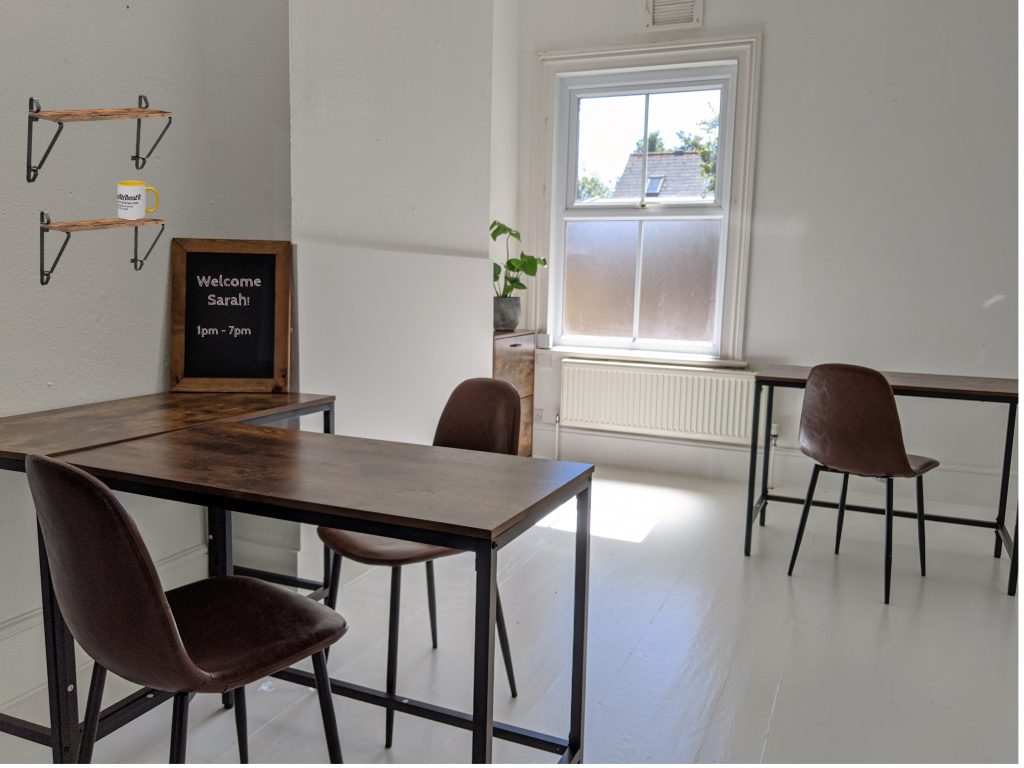
Finding suitable space away from the home for private tuition has been increasingly difficult, so we have purposely designed the front area of the centre to be used by local private tutors seeking a quiet & comfortable working space alongside their tutees (whether that is in person, or online).
Co-Working space is a flexible way to work within an office without the pressure (and cost!) of an ongoing contract, but with the benefits of a desk, WiFi, and the office kitchen. Tutors can hire a desk for just a day, or on a more regular basis with everything they need included (WiFi, refreshments, reception area). Co-Working space is available for tutors from 10am – 8pm with an option to reduce the cost through regular bookings.
Our Co-Working spaces are open plan and laid out to allow for social distancing. We have also reduced the number of bookings for each space to one per day to allow each “station” to be fully sanitised – tutors are given a “tutor pack” for the day including stationary (to keep) and a mug (returned & sanitised) to ensure that no equipment is shared.
Student Study Support
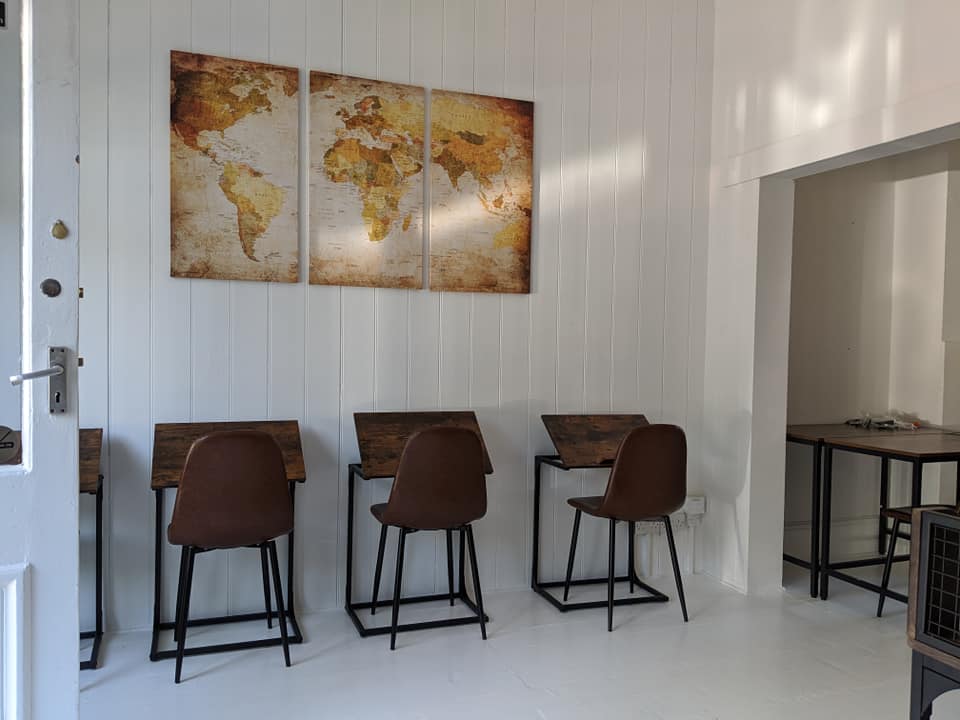
Not all tuition is the same, and our homework / study clubs run on Tuesday & Thursdays for 1-3 hours after school providing a quiet working space for a range of subjects with a qualified teacher on hand to provide supervision and support where needed.
Each student is assigned an individual, adjustable desk creating a comfortable environment for them whether they are completing Maths, English, or even Art! At present, the desks are arranged to allow for students to face away from others and we will continue to monitor public health advice on desk positions.
Our study club runs from 3.30pm – 6.30pm each Tuesday & Thursday during term time. The majority of the sessions are supervised by me (Holly), but will occasionally be run by other fully qualified tutors. A second member of staff is always in the building.
Online Tuition & Private Exams
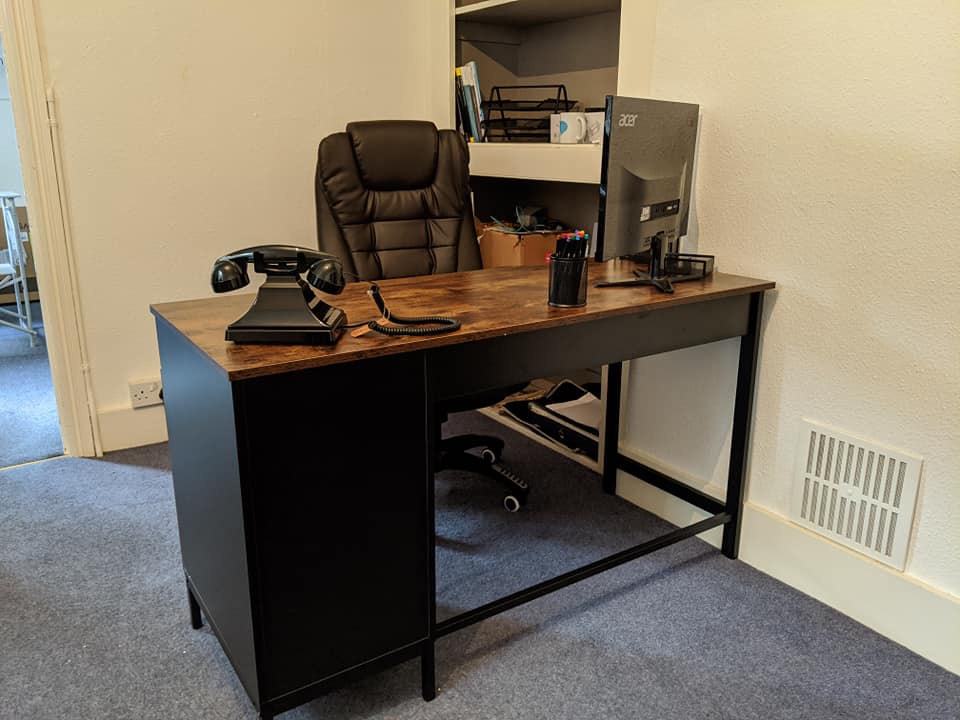
An additional two “office” areas have been created at the back of the centre for online tuition and the ability for students to sit on-screen exams.
The middle room is occupied by me (Holly!) where I run my Computer Science tuition alongside supporting other tutors through the Tutor’s Teaching & Learning Network, and run online CPD for teachers on behalf of NCCE. This room also contains two exam stations for IT exams. This space also allows me to support students who need a little more quiet during in-person tuition, or where lessons need to be less formal – there’s even space to study on the floor! (… think robotics!)
The back room is occupied by Jay Shurey of TeachAllAboutIt – Film & JQS Media where he runs his Film studies tuition and distance learning courses. We’re absolutely delighted to have Jay as a permanent fixture in the centre!
Accessibility
Accessibility is a huge factor for anywhere that I work (especially as a wheelchair user), so even though the centre is in an old Victorian building, we’ve added lots of accessibility features. You can see a full accessibility statement here where details of the centre including physical access are listed in full.
TeachAllAboutIt was founded on the idea that education should be accessible for all, including students and teachers. Where a tutor or student requires additional access, we will always be willing to discuss potential improvements.
A Note on COVID Safety
In order to open safely to the public, we have introduced a number of precautions to increase protection for tutors, students, and their families.
- We are currently unable to provide students with laptops although they are welcome to bring their own pre-charged devices.
- We request that all students over age 11 and parents wear a mask within the tuition centre unless medically exempt.
- Hand sanitizer is provided and we ask that everyone uses this upon entry and exit.
- Each student will be provided with a dedicated study pack including pens, pencils, & paper which will be stored within a plastic folder which is cleaned after use to prevent cross-contamination.
- Students will be provided with refreshments as part of the study club. All refreshments are pre-wrapped to meet hygiene standards.
- We have reduced the capacity and placement of study desks to enable social distancing.
- Desks & chairs are fully disinfected with alcohol-based wipes after each use.
Getting Here & Disability Access
The TeachAllAboutIt Tuition Centre is situated within an old building, however we have added a number of features to make this more accessible to adults and children. If you have any additional access requirements, please do get in contact and we will do our very best to assist.
Getting Here
The full address of the tuition centre is 303 Tarring Road, Worthing, BN11 5JG. We encourage everyone to make use of the excellent public transport links to the centre, but understand that this is not possible or practical for all.
By Car: There is a number of on-road parking areas around the centre without restrictions however these are often used by residents and often unavailable. There is a public car park 180m containing 38 spaces including 4 blue badge bays.

By Train: West Worthing train station is 180m away from the centre with even pavements and drop curbs.
By Bus: The closest bus route stopping by the centre is the number 10 route. This stops 400m from the centre and requires you to cross West Worthing railway crossing. Alternatively, you may wish to use the Pulse which has a walk of 350m from West Avenue travelling North towards Tarring Road.
You can use the interactive map below to find the best route for you by clicking “more options” and entering your address instead of “Centenary House”:
Getting In
The centre is accessed fromt the pavement. The main doorway is 96cm wide.
There is a 110mm step up into the centre which is accessed using a 6ft temporary ramp. We are currently working with Access to Work to install a more permanent ramp. Inside the door is a 40mm step with a doormat making this a 35mm shallow step.
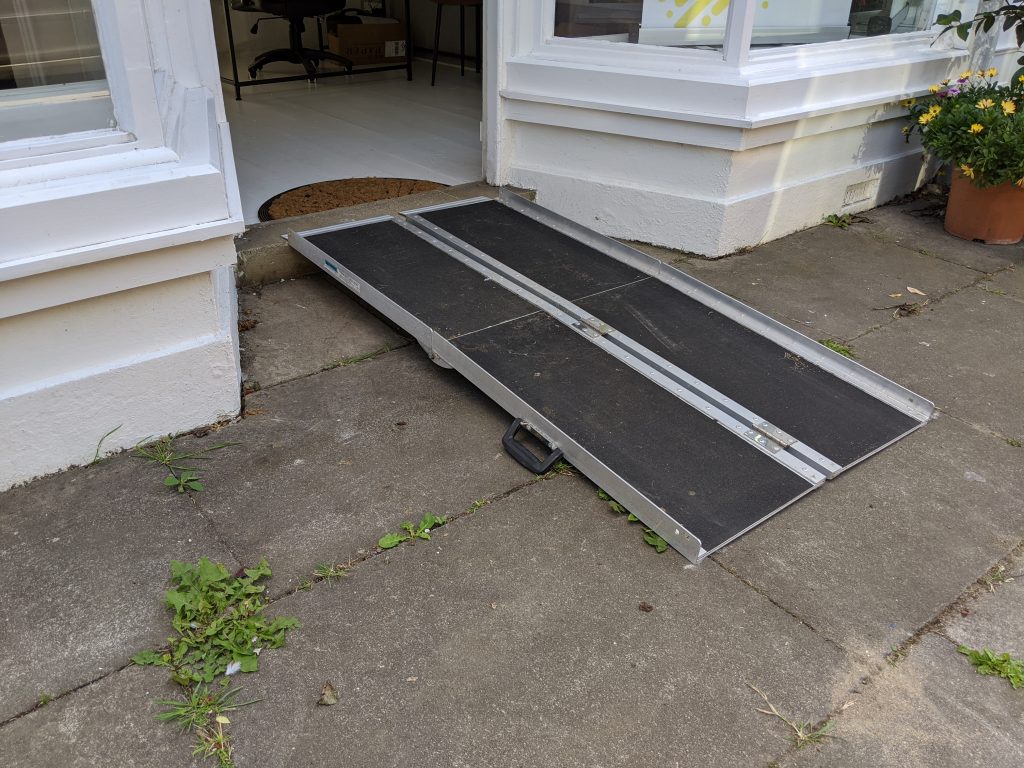
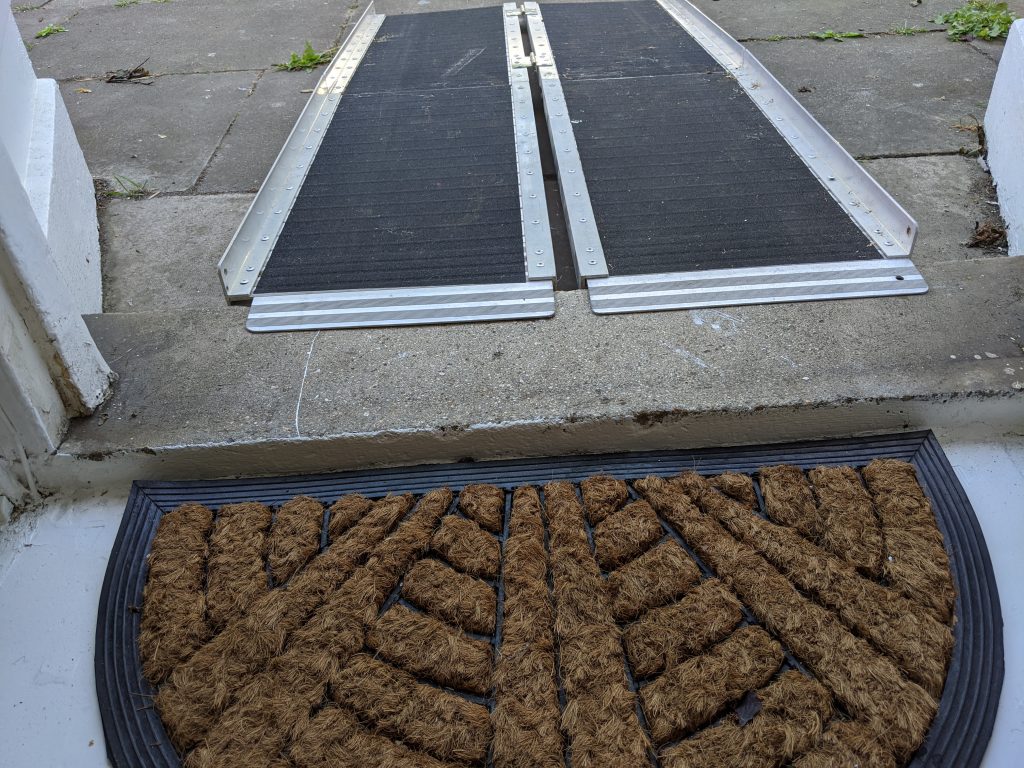
(A Google street view has been provided below)
Getting Around
To assist those who require physical access to the centre, we have provided detailed information below regarding the physical layout of the building. The centre is all at ground floor level. However, there is a level change between the front and rear of the centre which has ramped access.

(click image for a larger version)
Front Tuition Area
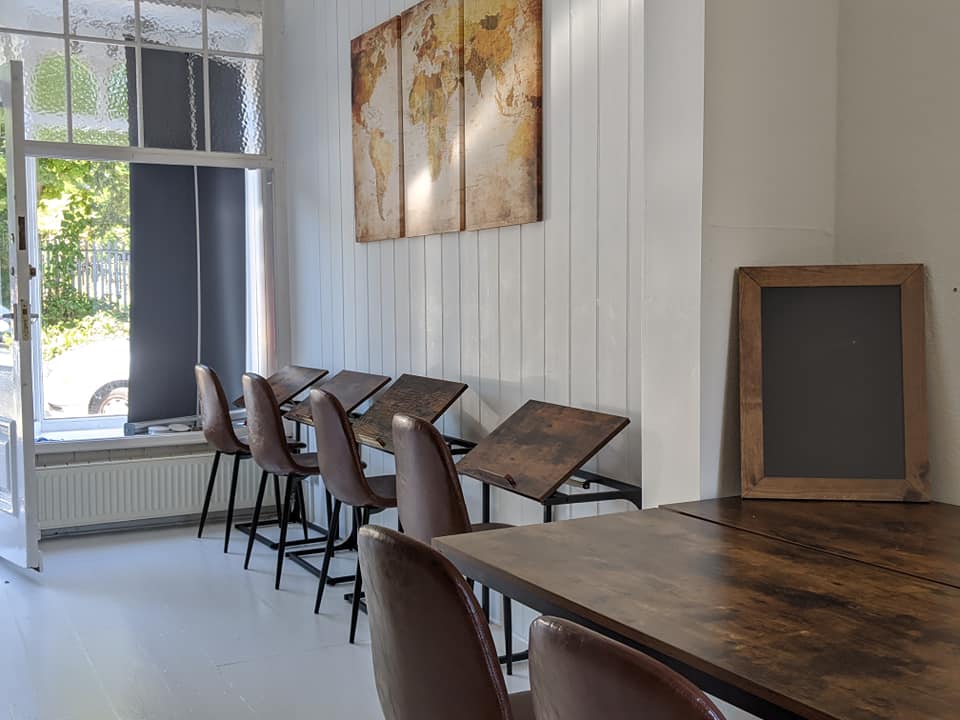
The floors in the front of the centre are hard painted white wood. Walls are white, with a single grey wall at the front. The front windows are covered by a frosted film to prevent the public from seeing inside, but allowing natural light into the room. Lighting in both sections in via yellow tinted standard bulb (no strip lighting).
All furniture is easily movable and can be rearranged to accommodate access. Tables are black metal & dark wood, chairs are black metal & brown faux leather (pvc). Individual student desks are 66cm tall at the front and are adjustable to an angle with a ridge to hold a laptop or tablet.

The back section of the front tuition area is laid out for two 1-2-1 tuition spaces with Windows PCs on each. The desks are 75.9cm high and are easily movable to accommodate wheelchairs. Carpeted rugs are placed in the front and rear sections of the room to dampen noise.
Tuition may take place at the computers or main desks. The main office router is situated in the front of this room.
In the video below, a full walkthrough of the centre is shown including audio for those sensitive to noise. The wheelchair shown in the video is an 17″ active user chair.
Middle Room – Office
From the front tuition area to the back rooms. There is a doorway (79cm wide) with a right angle left to a corridor (86cm wide) leading to a second doorway 79cm wide. This door has a step down of 100mm with a fibreglass doorway ramp with grip surface.
The middle room, used as an office is carpeted in short pile mid-blue carpet with white walls and a central bulb light. This leads to the back rooms through a doorway (78cm wide).
Back Room – Office
The back room, used as an office and quiet tuition is carpeted in short pile mid-blue carpet with white walls and a central bulb light. This room contains a rear secondary emergency exit (74cm wide) with a large 140mm step down to an external path. This room leads to the kitchenette & toilet through a doorway (78cm wide).
Kitchen & Toilet
The bathroom is 154cm x 140cm in size and is not wheelchair accessible. The toilet is accessed through a doorway (79cm wide) with a 20mm step down. The toilet & basin are both standard height.
